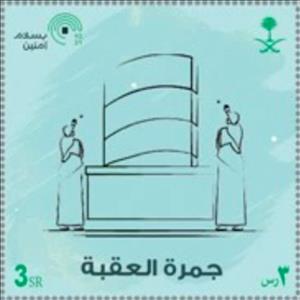Stamp: Pilgrims throwing stones at pillar (Saudi Arabia 2021)
Pilgrims throwing stones at pillar (Saudi Arabia 2021)
15 July (Saudi Arabia ) within release Holy Sites in Mecca (2021) goes into circulation Stamp Pilgrims throwing stones at pillar face value 3 Saudi riyal
| Stamp Pilgrims throwing stones at pillar in catalogues | |
|---|---|
| Stamp Number: | Sn: SA 1506c |
| Colnect codes: | Col: SA 2021.07.15-01c |
Stamp is square format.
Also in the issue Holy Sites in Mecca (2021):
- Stamp - Emblem of the 2021 Pilgrimage face value 3;
- Stamp - Kaaba face value 3;
- Stamp - Map of Camps in Mina face value 3;
- Stamp - Mount Arafat face value 3;
- Stamp - Pilgrims throwing stones at pillar face value 3;
- Stamp - Pilgrims with arms raised in supplication face value 3;
Stamp Pilgrims throwing stones at pillar it reflects the thematic directions:
Religion is any cultural system of designated behaviors and practices, world views, texts, sanctified places, ethics, or organizations, that relate humanity to the supernatural or transcendental. Religions relate humanity to what anthropologist Clifford Geertz has referred to as a cosmic "order of existence". Different religions may or may not contain various elements ranging from the "divine", "sacred things", "faith", a "supernatural being or supernatural beings" or "some sort of ultimacy and transcendence that will provide norms and power for the rest of life". Religious practices may include rituals, sermons, commemoration or veneration (of deities), sacrifices, festivals, feasts, trances, initiations, funerary services, matrimonial services, meditation, prayer, music, art, dance, public service, or other aspects of human culture. Religions have sacred histories and narratives, which may be preserved in sacred scriptures, and symbols and holy places, that aim mostly to give a meaning to life. Religions may contain symbolic stories, which are sometimes said by followers to be true, that have the side purpose of explaining the origin of life, the Universe and other things. Traditionally, faith, in addition to reason, has been considered a source of religious beliefs. There are an estimated 10,000 distinct religions worldwide. About 84% of the world's population is affiliated with one of the five largest religions, namely Christianity, Islam, Hinduism, Buddhism or forms of folk religion.
Tourism is travel for pleasure or business; also the theory and practice of touring, the business of attracting, accommodating, and entertaining tourists, and the business of operating tours. Tourism may be international, or within the traveller's country. The World Tourism Organization defines tourism more generally, in terms which go "beyond the common perception of tourism as being limited to holiday activity only", as people "traveling to and staying in places outside their usual environment for not more than one consecutive year for leisure, business and other purposes". Tourism can be domestic or international, and international tourism has both incoming and outgoing implications on a country's balance of payments. Today, tourism is a major source of income for many countries, and affects the economy of both the source and host countries, in some cases being of vital importance.


